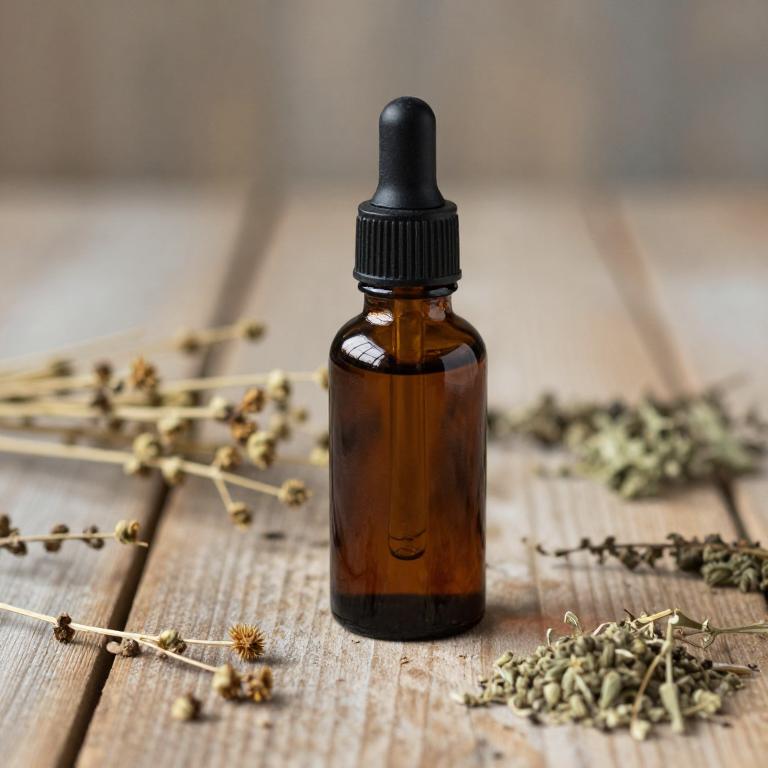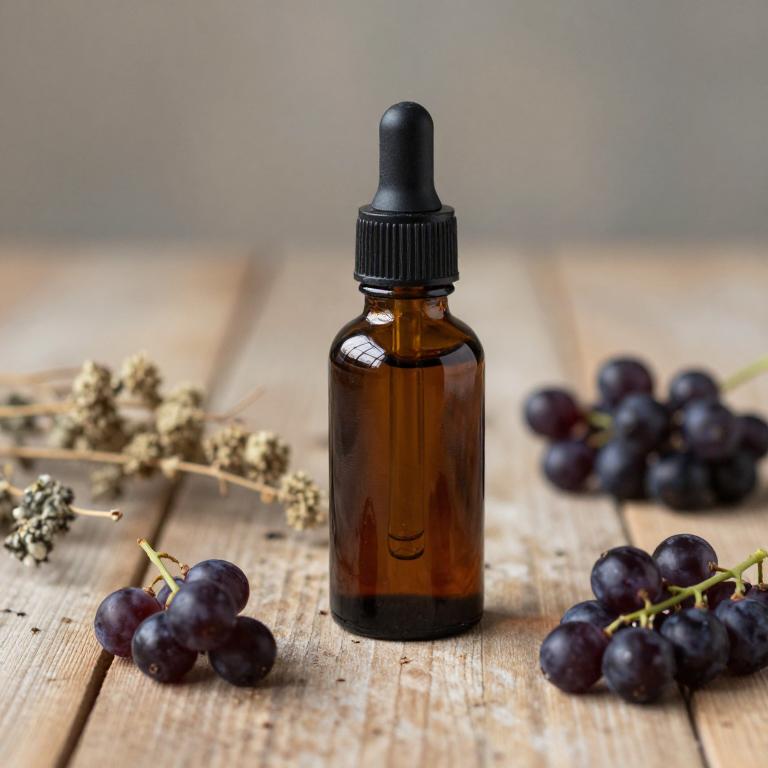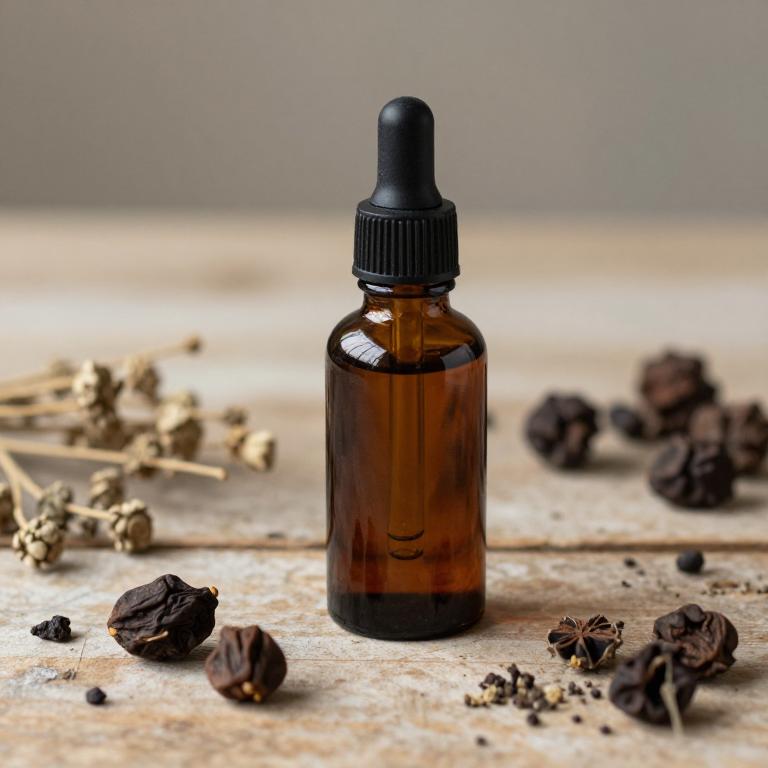10 Best Herbal Tinctures For Acid Reflux

Herbal tinctures offer a natural alternative for managing acid reflux by utilizing plant-based compounds that can soothe the digestive system and reduce stomach acid production.
Commonly used herbs include licorice root, ginger, chamomile, and fennel, each known for its anti-inflammatory and digestive benefits. These tinctures are typically prepared by soaking herbs in alcohol or glycerin to extract their active components, making them easy to consume in small doses. While they may provide relief for some individuals, it is important to consult with a healthcare provider before use, especially if symptoms persist or are severe.
Overall, herbal tinctures can be a complementary approach to conventional treatments for acid reflux.
Table of Contents
- 1. Licorice (Glycyrrhiza glabra)
- 2. Thistle (Silybum marianum)
- 3. Stinging nettle (Urtica dioica)
- 4. Chamomile (Matricaria chamomilla)
- 5. Ginger (Zingiber officinale)
- 6. Fennel (Foeniculum vulgare)
- 7. Cumin (Cuminum cyminum)
- 8. Common grape (Vitis vinifera)
- 9. Dog rose (Rosa canina)
- 10. Black pepper (Piper nigrum)
1. Licorice (Glycyrrhiza glabra)

Glycyrrhiza glabra, commonly known as licorice root, is often used in herbal tinctures to support digestive health, including relief from acid reflux.
The active compounds in licorice root, such as glycyrrhizin and flavonoids, are believed to reduce inflammation and soothe the lining of the esophagus and stomach. When used as a tincture, glycyrrhiza glabra may help neutralize stomach acid and enhance the protective barrier of the gastrointestinal tract. However, long-term use of licorice root tinctures can lead to side effects such as hypertension and fluid retention due to its effect on the adrenal glands.
It is advisable to consult a healthcare professional before using licorice root tinctures, especially for individuals with preexisting health conditions.
2. Thistle (Silybum marianum)

Silybum marianum, commonly known as milk thistle, is a herbal remedy that has been traditionally used for its potential liver-protecting properties.
While it is not a direct treatment for acid reflux, some studies suggest that its anti-inflammatory and antioxidant compounds may support digestive health and reduce stomach irritation. Herbal tinctures made from Silybum marianum are often taken orally, typically in capsule or liquid form, and may be used as a complementary therapy alongside conventional treatments for acid reflux. However, it is important to consult with a healthcare provider before using milk thistle, as it can interact with certain medications and may not be suitable for everyone.
Overall, while it may offer some supportive benefits, it should not replace medical advice or prescribed treatments for acid reflux.
3. Stinging nettle (Urtica dioica)

Urtica dioica, commonly known as stinging nettle, has been used in herbal medicine for its potential anti-inflammatory and digestive benefits.
When prepared as a tincture, it may support gastrointestinal health by reducing irritation and promoting healthy digestion. Some individuals with acid reflux report relief from using stinging nettle tinctures due to their high mineral content and ability to soothe the lining of the esophagus. However, it is important to consult with a healthcare provider before starting any herbal treatment, as individual responses can vary.
While research on its efficacy for acid reflux is limited, many holistic practitioners recommend it as a complementary therapy when used alongside conventional treatments.
4. Chamomile (Matricaria chamomilla)

Matricaria chamomilla, commonly known as chamomile, is often used in herbal tinctures to support digestive health and alleviate symptoms of acid reflux.
The tincture form of chamomile is valued for its mild, calming properties that may help reduce stomach irritation and soothe the gastrointestinal tract. Chamomile contains compounds like apigenin and bisabolol, which have anti-inflammatory and antispasmodic effects that may help ease heartburn and indigestion. While it is generally considered safe for most people, it is important to consult with a healthcare provider before use, especially if you are pregnant, nursing, or taking other medications.
Overall, chamomile tinctures can be a gentle, natural option for managing acid reflux when used as part of a holistic approach to digestive wellness.
5. Ginger (Zingiber officinale)

Zingiber officinale, commonly known as ginger, has been traditionally used for its medicinal properties, including its potential to alleviate symptoms of acid reflux.
Ginger tinctures are concentrated liquid extracts made from fresh or dried ginger root, often combined with alcohol or glycerin to preserve the active compounds. These tinctures may help reduce nausea and soothe the digestive system due to ginger's anti-inflammatory and carminative effects. However, while some studies suggest ginger may offer relief for heartburn, individual responses can vary, and it is advisable to consult a healthcare professional before use, especially for those with chronic acid reflux or on medication.
Overall, ginger tinctures can be a natural complement to a holistic approach in managing acid reflux symptoms.
6. Fennel (Foeniculum vulgare)

Foeniculum vulgare, commonly known as fennel, is often used in herbal tinctures to support digestive health and alleviate symptoms of acid reflux.
The tincture is typically prepared by soaking the dried seeds in alcohol, allowing the active compounds to be extracted for enhanced potency. Fennel contains compounds like anethole and limonene, which may help reduce stomach acid and soothe the gastrointestinal tract. Many people find that taking a small dose of fennel tincture before meals can ease heartburn and bloating associated with acid reflux.
However, it is important to consult with a healthcare provider before using fennel tinctures, especially for those with existing medical conditions or taking medications.
7. Cumin (Cuminum cyminum)

Cuminum cyminum, commonly known as cumin, has been traditionally used in herbal medicine for its digestive benefits, and its tincture form is increasingly being explored for its potential to alleviate symptoms of acid reflux.
The essential oils in cumin tinctures, such as limonene and carvone, may help reduce stomach acidity and soothe the lining of the esophagus. Some studies suggest that cumin can enhance digestion and prevent the backflow of stomach acid into the esophagus, which is a primary cause of heartburn. However, while anecdotal evidence supports its use, more clinical research is needed to confirm its efficacy and safety for managing acid reflux.
As with any herbal remedy, it is advisable to consult a healthcare professional before incorporating cumin tinctures into a treatment plan.
8. Common grape (Vitis vinifera)

Vitis vinifera, commonly known as the grape vine, has been traditionally used in herbal medicine for its potential digestive benefits.
Herbal tinctures made from Vitis vinifera are often prepared using the leaves, berries, or roots and are believed to support gastrointestinal health. These tinctures may help alleviate symptoms of acid reflux by reducing inflammation and promoting the production of protective mucus in the stomach lining. Some studies suggest that compounds in Vitis vinifera, such as resveratrol, may have antioxidant and anti-inflammatory properties that contribute to its efficacy.
However, it is important to consult a healthcare professional before using these tinctures, as they may interact with other medications or have side effects in certain individuals.
9. Dog rose (Rosa canina)

Rosa canina, also known as rosehip, is a traditional herbal remedy that has been used for centuries to support digestive health.
Rosa canina herbal tinctures are made by steeping the dried fruits of the rose plant in alcohol, creating a concentrated form of the plant's beneficial compounds. These tinctures are often recommended for individuals suffering from acid reflux due to their high content of antioxidants, vitamins, and anti-inflammatory properties. The anti-inflammatory effects of rosehip may help reduce irritation in the esophagus and stomach lining, while its mild astringent properties can aid in soothing excess acid.
However, it is important to consult with a healthcare professional before using rosehip tinctures, especially if you are taking other medications or have underlying health conditions.
10. Black pepper (Piper nigrum)

Piper nigrum, commonly known as black pepper, is often used in herbal tinctures for its potential digestive benefits.
The active compound in black pepper, piperine, is believed to enhance the absorption of other nutrients and may support gastrointestinal health. Some individuals use black pepper tinctures to alleviate symptoms of acid reflux by promoting healthy digestion and reducing stomach discomfort. However, it is important to consult with a healthcare professional before using these tinctures, as they may interact with certain medications or exacerbate existing conditions.
While anecdotal evidence suggests possible relief, scientific research on its efficacy for acid reflux is limited.